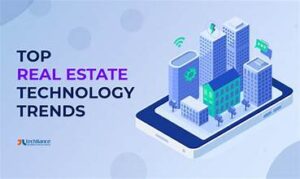
As we venture further into 2024, the real estate industry is experiencing a transformative shift driven by technological advancements. These innovations are reshaping how property management and sales are conducted, offering new opportunities and efficiencies. In this comprehensive guide, we’ll explore the top real estate technology trends of 2024 and how they’re revolutionizing the industry.
1. Artificial Intelligence and Machine Learning
Artificial Intelligence (AI) and Machine Learning (ML) have become indispensable tools in the real estate sector. In 2024, these technologies are enhancing various aspects of property management and sales.
AI in Property Valuation: AI algorithms analyze vast amounts of data to provide accurate property valuations. By considering historical data, market trends, and property features, AI can offer more precise pricing, helping buyers and sellers make informed decisions.
Chatbots and Virtual Assistants: AI-powered chatbots are streamlining customer service by handling inquiries, scheduling viewings, and providing information about properties. Virtual assistants are also helping property managers with tasks such as lease renewals and maintenance requests.
Predictive Analytics: AI and ML are used to predict market trends and buyer behavior. This helps real estate professionals anticipate demand, set competitive pricing, and identify potential investment opportunities.
2. Blockchain Technology
Blockchain technology is making waves in real estate by offering increased transparency, security, and efficiency in transactions.
Smart Contracts: Blockchain enables the use of smart contracts, which automate and secure the execution of agreements. Smart contracts can facilitate property transactions, ensuring that all conditions are met before the transfer of ownership.
Property Ownership Records: Blockchain can provide a tamper-proof ledger of property ownership records. This reduces the risk of fraud and errors, streamlining the due diligence process for buyers and sellers.
Tokenization of Real Estate: Tokenization allows real estate assets to be divided into digital tokens, which can be bought, sold, or traded. This opens up new investment opportunities and increases liquidity in the real estate market.
3. Virtual and Augmented Reality
Virtual Reality (VR) and Augmented Reality (AR) are transforming how properties are marketed and experienced.
Virtual Tours: VR technology enables potential buyers to take immersive virtual tours of properties from the comfort of their homes. This technology is particularly beneficial for remote buyers and those looking to explore multiple properties quickly.
AR for Home Staging: AR applications allow buyers to visualize how different furnishings and decor would look in a property. This helps them envision their future home more clearly and make quicker decisions.
Interactive Property Listings: AR features can enhance property listings by providing interactive elements such as 3D floor plans and virtual staging options. This makes property marketing more engaging and informative.
4. Internet of Things (IoT)
The Internet of Things (IoT) is integrating smart devices into properties, offering enhanced automation and control.
Smart Home Devices: IoT-enabled devices such as smart thermostats, lighting systems, and security cameras are becoming standard in modern homes. These devices can be controlled remotely, offering convenience and energy efficiency to homeowners.
Building Management Systems: IoT technology is improving building management by providing real-time data on energy consumption, HVAC systems, and maintenance needs. This allows property managers to optimize building performance and reduce operational costs.
Tenant Experience Apps: IoT-powered apps are enhancing tenant experiences by providing features such as smart access controls, maintenance request tracking, and community engagement tools.
5. Big Data Analytics
Big Data analytics is revolutionizing the real estate industry by providing deeper insights into market trends and consumer behavior.
Market Analysis: Real estate professionals use big data to analyze market trends, identify emerging neighborhoods, and assess property values. This helps investors and developers make data-driven decisions.
Customer Insights: Big data analytics enables real estate companies to understand customer preferences and behaviors. This information can be used to tailor marketing strategies and improve customer service.
Risk Assessment: Big data helps assess risks associated with real estate investments. By analyzing factors such as economic indicators, property conditions, and market fluctuations, investors can make more informed decisions.
6. Green and Sustainable Technologies
Sustainability is becoming a key focus in real estate, with green technologies and practices gaining traction.
Energy-Efficient Buildings: Technologies such as energy-efficient HVAC systems, solar panels, and smart meters are becoming standard in new developments. These technologies reduce energy consumption and lower operating costs.
Green Building Certifications: Real estate developers are seeking green building certifications such as LEED (Leadership in Energy and Environmental Design) to demonstrate their commitment to sustainability. These certifications can enhance property value and appeal to environmentally conscious buyers.
Sustainable Materials: The use of sustainable building materials, such as recycled or eco-friendly products, is on the rise. These materials contribute to reducing the environmental impact of construction and promote greener living.
7. PropTech Innovations
PropTech, or property technology, encompasses a range of innovations designed to improve the real estate industry.
Property Management Software: Modern property management software offers features such as automated rent collection, tenant communication, and maintenance tracking. These tools streamline property management tasks and improve efficiency.
Real Estate Marketplaces: Online real estate marketplaces are evolving with advanced search features, personalized recommendations, and virtual assistance. These platforms make it easier for buyers and renters to find suitable properties.
Investment Platforms: PropTech innovations include platforms that facilitate real estate crowdfunding and fractional ownership. These platforms make real estate investment more accessible and diversified.
Conclusion
The real estate industry in 2024 is witnessing significant advancements driven by technology. From AI and blockchain to VR and IoT, these innovations are reshaping property management and sales, offering greater efficiency, transparency, and convenience. As these technologies continue to evolve, they will play an increasingly pivotal role in shaping the future of real estate. By staying informed about these trends, real estate professionals can leverage these advancements to stay competitive and meet the changing needs of their clients.




